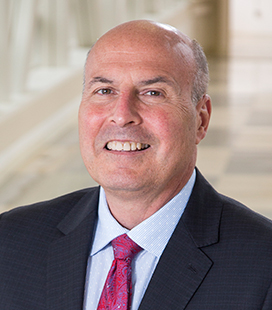
Dr. Steven Brower, Medical Director of the Lefcourt Family Cancer Treatment and Wellness Center and Chief of Surgical Oncology at Englewood Health
You can match a blood transfusion to a blood type… What if matching a cancer cure to our genetic code was just as easy, just as standard?” asked President Barack Obama, addressing a crowd of health representatives in the East Wing of the White House, in January 2015.
Precision medicine is a new approach to disease prevention and treatment that takes into account a patient’s genes, environment and lifestyle, and customizes medical decisions based on that information. This is a departure from traditional medicine, wherein medical decisions were made for patients based on the typical characteristics of the disease they have, rather than their bodies’ unique characteristics in relation to that disease.
Dr. Steven Brower is the medical director of The Lefcourt Family Cancer Treatment and Wellness Center, as well as chief of surgical oncology at Englewood Health.
“Everything used to be about treatment,” he said. “You would make the diagnosis and then hopefully deliver the most appropriate surgery, radiation or chemotherapy. But it was a therapy based on a tumor type, not so much an individual patient’s tumor.”
Dr. Brower explained that what has changed is the foundational questions doctors ask themselves when faced with making decisions for their cancer patients. “The questions were once: what is best for all breast cancer patients? What is best for all lung cancer patients? Well today, precision medicine is just about that patient, that particular tumor, at that moment in time,” Dr. Brower said.
Instead of using what Dr. Brower refers to as “a shotgun approach” to all tumors, doctors are now studying cellular and molecular characteristics and genes in order to provide customized treatment to their patients. Removing the generalizations means that doctors will only embark upon treatment that is appropriate for their patients, potentially eliminating needless surgeries, invasive tests and wasted efforts.
Advancements in diagnostic technology play a major role in pushing forward the mission of precision medicine. The invention of the MRI/ultrasound fusion biopsy has revolutionized the process of detecting prostate cancer and strategizing treatment. Determining whether a prostate cancer patient is high or low risk is crucially important because the treatments for prostate cancer can range anywhere from surveillance of the cancer, to surgery or radiation treatment.
“In the past it was pretty much a blind biopsy. Now, this new MRI/ultrasound fusion biopsy more accurately determines whether a patient has high-risk prostate cancer or low-risk. And by making this determination, physicians can better inform patients about their treatment options,” Dr. Brower said.
Each week at Englewood Hospital an elite group of medical professionals gather in a kind of round-table setting. At the table sits experts in medical, surgical and radiation oncology, as well as experts in genetics, survivorship and pain management. Specialists in all types of cancer are present to discuss thoroughly the best and most precise options for new patients.
“It’s like the patient is getting an opinion, not from one doctor, but from 20 different people. We consider the various new targets that have been introduced so that precision medicine is considered for each patient,” Dr. Brower said.
Precision medicine teaches us that information is power. Dr. Brower and his colleagues at Englewood Hospital arm their patients with information that will empower them to become active participants in their own medical decision-making.
“It used to be that all the information patients got about a disease came from doctors—that’s very old school. Today, there are thousands of advocacy groups out there for patients with cancer that are extraordinarily encyclopedic in their knowledge,” Dr. Brower said.
Dr. Brower urges his patients’ to pursue advocacy groups to connect with other patients who have been treated for similar kinds of cancer. These connections allow patients to trade information and feel more secure in the recommendations given to them by their personal doctors. Patients can access the National Cancer Institute and American Cancer Society websites to begin this process.
Posted September 2018

Dr. Steven Brower, Medical Director of the Lefcourt Family Cancer Treatment and Wellness Center and Chief of Surgical Oncology at Englewood Health
